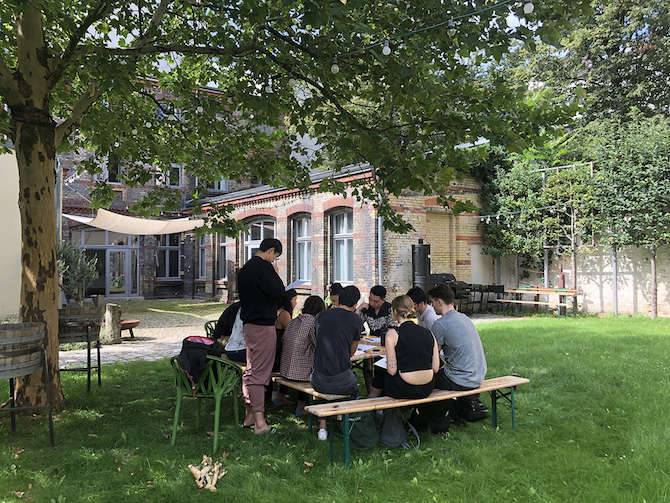University of Melbourne
12 - 23 August 2019

Unliveable Berlin is a master's level design studio at the University of Melbourne led by Michael Roper (Director, Architecture Architecture). Running in the second semester of 2019, this studio takes a group of architecture and landscape design students to ANCB The Metropolitan Laboratory in Berlin. Here, students undertook research into the history of Berlin’s experimental housing projects before developing design proposals of their own.
The Brief
The Prinzessinnengärten is an established community garden much loved by the people of Berlin. Its destruction would be a wound to the city, yet every year pressure mounts for sites such as these to be developed for financial return.
Acknowledging the inevitability of these pressures, Unliveable Berlin challenges students to develop experimental housing projects that would realise the site’s financial opportunity while retaining or reinstating the invaluable community asset of the gardens.
Studio Theme: Inclusive Cities
Architecture is a manifestation of our social, economic and political values; an expression of our collective identity. But how encompassing is it?
Through architecture we speak of people, their needs and their aspirations. Every building is an entry into the story of our cities. Yet for every story written, untold others are written over. How can architecture come to terms with its tendency for both the creation and erasure of identity?
Rather than playing to the dominant narrative, how can architecture accommodate for difference, uncertainty and change? How can we, as architects, design with purpose and vision without being deterministic?
In today’s parlance, these concerns might be expressed as a tension between the virtues of top-down and bottom-up development. The students explore this in the studio through readings of Cupers and Miessen’s Spaces of Uncertainty, Berlin Revisited.
With its chequered history of cultural exclusion and ideological seclusion, as well as an impressive record of refugee accommodation, Berlin presents a unique case study in the urban consequences of social disunity and cohesion. In this context questions emerge - how does a city express its hostilities and how, as architects, can we foster cities of inclusion?
Case Studies: Experimental Housing, Berlin
By way of introduction to Berlin’s urbanism, history and cultural context, as well as an introduction to the key considerations of apartment design, students undertook research into the IBA social housing projects, critiquing these projects through three lenses: 1. their response to Berlin’s urban morphology (urban realm); 2. spatial strategies adopted to foster local community (communal realm); 3. the quality and amenity of the individual apartments (private realm).
Esra Akcan’s detailed account of the IBA Projects, Open Architecture served as a foundational text for this research. Esra joined the group in Berlin to deliver a lecture on the subject, as well as to lead the group on a day-long walking tour through Kreuzberg, where the majority of these projects stand today.
Final Presentations
Students presented their design proposals on Friday, 23 August 2019 under the review of guest critics:
Lena Kleinheinz, magma architects, Berlin
Martin Ostermann, magma architects, Berlin
Alana Denham-Preston, Australian Embassy, Berlin
Studio Coordinator: Michael Roper, Director, Architecture Architecture

